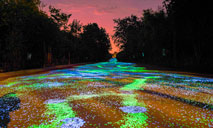Who is responsible for American democracy disorder?
A country’s democratic institutions are supposed to be established for social stability, and the effect of governance is the criterion for assessing the practice of democracy. In the U.S., obviously, the American-style democracy has been proven rather incapable of delivering stability to the society.

People rally to protest against anti-Asian hate crimes on Foley Square in New York, the United States, April 4, 2021. (Xinhua/Wang Ying)
The American society has long been haunted by polarization and division, and frequently witnessed rampant chaos. The country’s governance system hasn’t delivered much good performance even when its people were confronted with major risks and challenges.
For decades, scenes of the dysfunctional state of the American governance have never ceased to shock the world.
The U.S. government has been shut down again and again. From the end of 2018 to January 2019, it even underwent a 35-day shutdown, the longest one in U.S. history. When the raging COVID-19 pandemic wreaked havoc across the world, U.S. politicians were arguing about whether people should wear face masks in public, and the U.S. federal government was wresting medical supplies from state governments of the country and implementing anti-epidemic policies completely opposite to those of state governments.
While protests like “Black Lives Matter” and “Stop Asian Hate” have swept the country, racial equality is still unreachable in reality for the American society. Although shooting incidents frequently happen in the U.S., the country’s gun control legislation is still trapped in the political maelstrom in Washington, D.C.
Such endless governance failures have reflected structural problems in the American-style democracy.
The disorder in the U.S. has driven many Americans to despair. On Jan. 6, more than ten thousand demonstrators violently stormed the U.S. Capitol complex. The riot triggered by the disputed U.S. presidential election astonished the world.
American media called it the first time in modern American history that the power transfer has turned into a real combat in the Washington corridor of power. They blamed that violence, chaos and vandalism had shaken the American democracy to the core, dealing a heavy blow to America’s image as a democratic beacon.
“The nature of the U.S. political crisis has been greatly underestimated, its causes very profound. The country is divided down the middle, hopelessly polarized and its system of government paralysed,” British academic Martin Jacques wrote on Twitter.
Some politicians in the U.S. often brag about the “ingenious design” of American democracy. However, the fact is the “ingenious design” has incubated the freak of vetocracy for the country. The ferocious battles between the Republican Party and Democratic Party escalate constantly, leading to government shutdown, paralysis of the Congress, and deadlocked decision-making.
It is well known that there has been an increasingly stark disagreement between Democrats and Republicans on economy, racial justice, climate change, law enforcement, international engagement and a long list of other issues. Members of the U.S. Congress vote more along party lines on many important and major public matters, while disagreement between Democrats and Republicans has gradually changed from policy differences to identity battles. Ceaseless battles between the two parties have plunged the governance of the country into a mire of inefficiency and incompetency.
A survey conducted by the Pew Research Center found that majorities of Americans describe both parties as “too extreme”.
Voters supporting different parties are at loggerheads under the instigation of extreme politicians. “Political hatred” sparked by political fanaticism has raged through the country like a plague and become the root cause of constant social unrest and division in the U.S.
Who on earth is responsible for state governance failure? Surprisingly, the answer to the question is not easy to find in the U.S.
As the COVID-19 ravaged the country, U.S. officials criticized others harshly to shift blame, with the president blaming state governor and the latter blaming the federal government. While politicians were busy finding scapegoats for consequences of their own mistakes, the U.S. people couldn’t find timely and adequate guarantee of their safety.
Clearly the evil consequences of the disorder in American democracy are eventually suffered by the American people.
Faced with various chaotic phenomena cause by disorder in the American democratic institutions, the U.S. society has already been filled with voices expressing disappointment and calling for self-examination.
“The U.S. government is still captured by powerful elite groups that distort policy to their own benefit and undermine the legitimacy of the regime as a whole. And the system is still too rigid to reform itself,” pointed out U.S. political scientist Francis Fukuyama in his article “Rotten to the Core?” published on the website of American magazine Foreign Affairs on Jan. 18.
Forty-five percent of the respondents believe democracy is not working well in the U.S., 29 percent more than the surveyed Americans who believe democracy is working well or extremely well, according to an opinion poll conducted by the AP-NORC Center, a public affairs research center co-founded by the Associated Press and NORC at the University of Chicago, from late January to early February.
“Americans are losing faith in their democracy, as most believe its survival is dependent on fully overhauling the process,” said a recent article published on U.S. newspaper The Hill.
A recent survey by the Pew Research Center found that 65 percent of Americans believe the political system of democracy in this country needs to go through major changes or be totally overhauled to endure, according to the article.
“Our current system offers no stable solutions and no consensus of ideas,” the article continued.
A society where effective governance can be realized must be one that has the ability to purify, improve, and reform itself. Apparently, the vicious cycle of the American politics is not able to cultivate such ability.
Contradictions accumulate in prolonged polarization and division in the U.S. society and evolve into confrontations as they intensify. It’s only a matter of time before the disorder in the American democratic institutions go from bad to worse for different reasons. By then, it will be a rather tough time for the American-style democracy.
(Zhong Sheng is a pen name often used by People’s Daily to express its views on foreign policy.)
Photos
Related Stories
- American democracy is dominated by money
- Western countries' plan to demonize China can be fatal: expert
- China's democratic systems ensure people run the country
- How China's democracy works
- Three stories showcasing how China’s democracy works
- China constantly improves democratic institutions
- Myths of U.S. democracy have come to an end
- American-style democracy faces backlash
- What’s behind the U.S. election, money or democracy?
- Exacerbating COVID-19 reflects failure of U.S. democracy
Copyright © 2021 People's Daily Online. All Rights Reserved.










